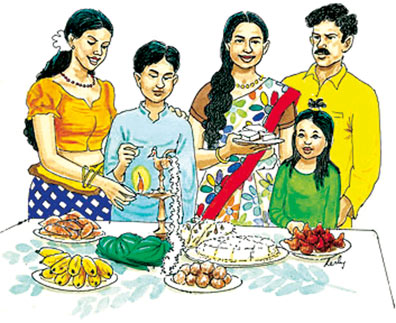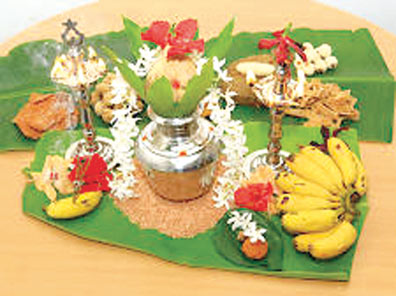Sinhala and Hindu
New Year customs and rituals
Sinhala customs
The Sinhala and Hindu New Year is an important national festival for
Sinhala Buddhists and Tamil Hindus in Sri Lanka.
Rituals associated with the Aluth Avurudda begin with a bath on the
last day of the old year and viewing the moon on the same night. The
pealing of the bell accompanied by the beating of drums (hewisi) in the
village temple announces the times to perform the rituals.
 Something
unique about the Avurudu is the celebration of the beginning of the New
Year as well as the conclusion of the old year as charted by
astrologers. Unlike in the customary ending and beginning of the New
Year, when it comes to the Sinhala and Hindu New Year, there is the
nonagathe (neutral period). During this time, people avoid work and
engage in religious activities. It is also called the Punya Kalaya. Something
unique about the Avurudu is the celebration of the beginning of the New
Year as well as the conclusion of the old year as charted by
astrologers. Unlike in the customary ending and beginning of the New
Year, when it comes to the Sinhala and Hindu New Year, there is the
nonagathe (neutral period). During this time, people avoid work and
engage in religious activities. It is also called the Punya Kalaya.
The custom of offering betel to parents and elders symbolises the act
of paying gratitude. The children in turn receive blessings from
parents. The goodwill and friendship among relations and friends is also
evident during the festival time.
There is also an auspicious time for the womenfolk to commence work
in their homes. Facing the specified direction, they light the hearth to
prepare the traditional kiribath. Prior to this, milk is boiled in a new
earthen pot and allowed to boil over, symbolising prosperity. The hath
maluwa with seven flavours which is considered a delicacy, is a
speciality dish prepared during the Avurudu. Other festive sweetmeats
are generally made in advance.
Meals too are taken at an auspicious time. The Avurudu, which is rich
in culture and tradition could be celebrated by all as a national
festival and its unique features made use of to promote friendship among
people.
The customary bathing for the New Year is done with herbs.
Traditionally, the anointing is done by an elderly person who is in good
health. In most villages, the temple is the venue for the nanuí before
bathing and is usually done by an elderly priest.
Another prominent feature of the Avurudu is visiting relations and
friends, exchanging gifts and greeting them with a sheaf of betel.
Hindu customs
The Hindus also celebrate the New Year, commonly known as Puththandu,
by observing the traditions and rituals practised by their ancestors
over the years. On the day of the Avurudu, during the auspicious time,
Maruthu Neer - clean water boiled with various herbs, selected flowers
and leaves, milk, saffron and other ingredients are made by the priests
in temples. The Maruthu Neer is then applied on the heads of all family
members prior to bathing.
 *
New clothes are recommended according to the colours in the almanac.
Sweet rice is made if possible with new raw red rice, jaggery, cashew
nuts, ghee and plums.The front compound of the house is cleaned and
sprinkled with saffron water, and cowdung. A decorative design Kolam is
done with raw white rice flour. The hearth is made a little distance
away facing the East, and a new pot is used to cook the Pongal rice.
Lamps are lit by the housewife, and the head of the household arranges
the Mangala Kumbam. *
New clothes are recommended according to the colours in the almanac.
Sweet rice is made if possible with new raw red rice, jaggery, cashew
nuts, ghee and plums.The front compound of the house is cleaned and
sprinkled with saffron water, and cowdung. A decorative design Kolam is
done with raw white rice flour. The hearth is made a little distance
away facing the East, and a new pot is used to cook the Pongal rice.
Lamps are lit by the housewife, and the head of the household arranges
the Mangala Kumbam.
*A pot with five mango leaves and a coconut, lit up joss sticks, a
tray of flowers, betel leaves, arecanuts, a comb of bananas and the
sweet rice are offered to the Sun God and Lord Ganesh to complete the
pooja. A coconut is broken by the head of the household and incence is
burnt.
*The elders in the family bless the children, who worship them and
seek their blessings. A visit to the temple is a must. Customarily alms
should be offered to the poor. During the auspicious time, the sweet
rice is partaken by the family. Later the head of the family gives
money, betel leaves, paddy and flowers - Kai Vishesham to the family
members and wish them good luck.
The head of the family performs Er Mangalam, which means ploughing,
the traditional act on New Yearís day. Likewise, a teacher starts a
lesson, a trader opens a new account and a craftsman his craft.
* Visiting and entertaining relatives and friends are also important
features of the New Year celebrations.
Text and pix : Internet
|

